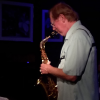Home » Jazz Articles » Album Review » Richie Beirach-Gregor Huebner Duo and the WDR Big Band: ...
Richie Beirach-Gregor Huebner Duo and the WDR Big Band: Crossing Borders
Bierach and Huebner, who have worked together as a duo for more than two decades, are classically trained musicians who move easily between the worlds of classical and jazz. To mark the rare and pleasurable experience of recording with the WDR, Huebner composed a brace of three-movement concertos, one for his violin, the other for Bierach's piano. The violin concerto is generally bellicose and strident with a classical temper, the piano concerto more restrained, harmonious and, yes, jazzy. As noted, something tailored to almost everyone's taste. The violin concerto, whose movements are titled "Kathmandu," "The Grave" and "Two Thousand 15," was inspired by a devastating earthquake that struck the Kathmandu area of Nepal in April 2015, the piano concerto by Huebner's long-time friendship with Bierach. Its first movement, "The Code," is Bierach's nickname; the second, "It's Enough," is based on a seventeenth-century German hymn, while the third, "Born in Brooklyn," pays homage to Bierach's home and earliest influences.
The violin concerto is sandwiched between a pair of Bierach's percussive compositions, "Rectilinear / Paradox" and "Snow Leopard," each of which showcases his robust piano against a teeming backdrop of brass and reeds earnestly hammered out by the WDR ensemble. After a bright and robust beginning wherein the band's horn players perform Bierach's improvisations from the 1978 album Eon by his trio with bassist George Mraz and drummer Jack DeJohnette, Huebner enters "Snow Leopard" slowly (pizzicato) before gathering momentum along with Bierach and the ensemble, leading to a vigorous and exhilarating final passage.
Bierach's piano concerto follows "Snow Leopard" and precedes two more of his refreshing themes, "Elm" and "Pendulum," both conducted by WDR director Rich DeRosa, as are "Rectilinear / Paradox" and "Snow Leopard." "Elm," written by Bierach on Christmas day 1979 in honor of his friend, the Polish violinist Zbigniew Seifert, who died that February, is a graceful ballad featuring Huebner's soulful violin and Bierach's pensive acoustic piano, while "Pendulum" the sort of irrepressible flag-waver that has rung down the curtain on many a big-band album. Bierach is especially sharp and beguiling here, Huebner warm and expressive as his colleague moves to electric piano and the WDR band, firmly anchored by drummer Hans Dekker, furnishes more than enough firepower to drive its guests across any remaining borders to the finish line.
High marks for concept, performance and musicianship, with the caveat that not everyone may find these borders spacious and seductive enough to cross.
Track Listing
Rectilinear/Paradox; Violin Concerto No, 3: Movt. 1 Kathmandu, Movt. 2 The Grave, Movt. 3 Two Thousand; Snow Leopard; Piano Concerto No. 3 "The Code": Movt. 1 Into The Quest, Movt. 2 It's Enough, Movt. 3 Born In Brooklyn; Elm; Pendulum.
Personnel
Richie Beirach
pianoRichie Beirach: piano; Gregor Huebner: violin; Rich DeRosa: conductor, arranger; Johan Hörlen: alto saxophone, alto flute; Karolina Strassmayer: alto saxophone, alto flute; Olivier Peters: tenor saxophone, clarinet; Paul Heller: tenor saxophone, clarinet; Jens Neufang: baritone saxophone, bass clarinet; Rob Bruynen: trumpet, flugelhorn; Andy Haderer: trumpet, flugelhorn; John Marshall: trumpet, flugelhorn; Wim Both: trumpet, flugelhorn; Ruud Breuls: trumpet, flugelhorn; Ludwig Nuss: trombone, euphonium; Shannon Barnett: trombone, euphonium; Andy Hunter: trombone, euphonium; Mattis Cederberg: bass trombone, tuba; Joachim Schonecker: guitar; John Goldsby: bass; Hans Dekker: drums.
Album information
Title: Crossing Borders | Year Released: 2019 | Record Label: Zoho Music
Tags
PREVIOUS / NEXT
Support All About Jazz
 All About Jazz has been a pillar of jazz since 1995, championing it as an art form and, more importantly, supporting the musicians who make it. Our enduring commitment has made "AAJ" one of the most culturally important websites of its kind, read by hundreds of thousands of fans, musicians and industry figures every month.
All About Jazz has been a pillar of jazz since 1995, championing it as an art form and, more importantly, supporting the musicians who make it. Our enduring commitment has made "AAJ" one of the most culturally important websites of its kind, read by hundreds of thousands of fans, musicians and industry figures every month.





















